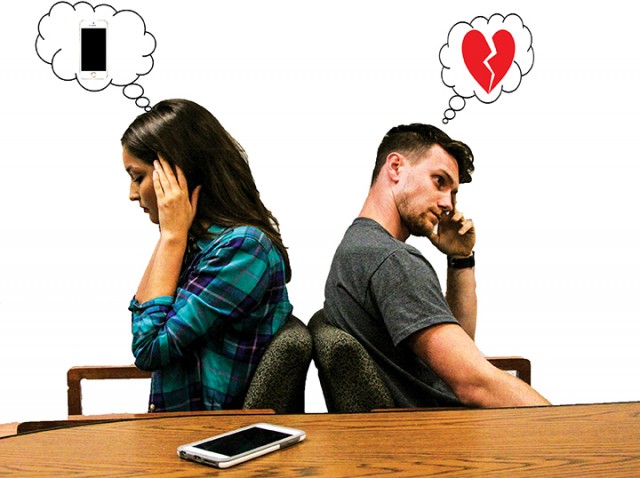Dr. James A. Roberts, The Ben H. Williams Professor of Marketing, and Dr. Meredith Davis, assistant professor of marketing, had their recent study, “My life has become a major distraction from my cell phone: Partner pphubbing and relationship satisfaction among romantic partners” published in Computers in Human Behavior journal.
A study done by two Baylor professors found that cellphones can cause damage to relationships and lead to depression.
“Pphubbing,” also known as “partner phone snubbing,” is described in their study as the extent to which people use or are distracted by their cellphones while in the company of their relationship partners.
Roberts said a huge part of how cellphone pphubbing can damage relationships is the way that it can affect another person’s feelings.
“First and foremost we are all human beings and we want to be taken seriously and be given full attention when we’re talking to somebody,” Roberts said.
Roberts added that one of the first things he and Davis did was create a nine-item pphubbing scale, many created by his students. Roberts defined what pphubbing was for his class and asked them to hand in five to 10 examples to help create the pphubbing scale.
Questions ranged from “When my partner’s cell phone rings he or she pulls it out even when we’re in the middle of a conversation” to “My partner glances at his/her cellphone when talking to me.”
The study found that the more pphubbing was performed, the more conflict it created, Roberts said. He added that relationships are the cornerstone to our happiness.
“When we’re unhappy in our marriage or in our relationship, we’re just not happy overall,” Roberts said. “Something that started out so innocent as a pphubbing was leading to conflict, lower satisfaction with our relationship, lower overall life satisfaction, we’re more than likely to be depressed.”
Roberts wrote the book, “Too much of a good thing: Are you addicted to your smartphone.” In it, he said when people phubb their partners, they are sending an implied message that the partners aren’t important.
“You use your smartphone, which makes you fight which makes you less happy with that relationships, which makes you less happy with your overall life that can kick up your depression,” Roberts said.
Roberts said people can be addicted to their cellphone., chapter three in his book discusses this. He added that a person can be addicted to a behavior just like you can be addicted to a substance.
Henderson graduate student Dlaine Miley said a big pet peeve of hers is being with her friends, but everyone has their eyes glued to their phones.
“I’m sure there’s really fascinating things on the Internet right now but there’s also a really fascinating person in front of you,” Miley said.
Miley touched on the topic of a possible correlation between frequent use of cellphones leads to depression, Miley said one thing that stuck out to her was realizing all the time she spends on her cellphone.
“We’re spending all this time on our phones. So, by spending all that time caring about other people’s lives, does that mean you care more about their lives then your own?” Miley said.
Miley added that a free app mentioned in Roberts’ book, “Moment,” tracks how long users are on their phones everyday.
“It makes you realize how much time you’re losing, and it’s kind of scary,” Miley said. “That’s time out of my day that I was just sitting there on my phone doing nothing of importance.”


